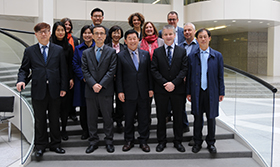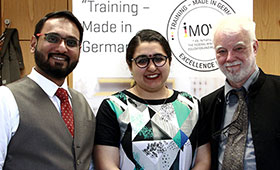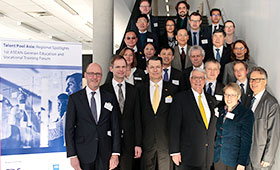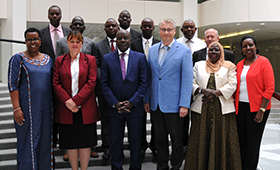
|
|||
Read more kongress2018.bibb.de/en/ |
|||
|
|||
|
The vocational education and training landscape is undergoing change in the wake of demographic and technological developments. Discernible signs of this shift include fewer trainees whose prior learning is, however, increasingly heterogeneous in nature, more demanding training contents, and matching problems on the training market that are beginning to perpetuate themselves. What are the impacts of all this on collaboration between the cooperation partners involved in vocational education and training? Where are new ways of working together coming into being, and how are existing cooperation arrangements being developed further in order to ensure high-quality training? |
|||
|
Editorial: Making use of the areas of potential offered by cooperation Hubert Ertl, Prof. Dr., Director of Research and Vice President of BIBB Whereas cooperation between learning venues in the dual system has been a traditional object of specialist discourse for some considerable time, we still await a cross-cutting approach towards dealing with new forms and contexts of cooperation within the vocational education and training sector. This seems to be an important prerequisite for the systematisation and stabilisation of cooperation. Against this background, the articles included in the present issue provide a good summary of the various areas in which new types of cooperation are emerging and in which different stakeholders have created cooperative structures that did not previously exist. Read more Editorial: Making use of the areas of potential offered by cooperation |
|||
|
Introduction of dual training in Slovakia Marthe Geiben, Eszter Csépe-Bannert In 2015, Slovakia passed a new vocational education and training act which also encompasses the introduction of dual training. Its provisions also include stipulations governing new opportunities for cooperation between the state and trade and industry at a national level and between schools and business both regionally and locally. This article presents these regulations and describes initial experiences with implementation by taking the development of training programmes for shoe makers as an example. |
|||
|
|||
|
Changes to examination regulations as a result of the interaction between company impetuses and (sub)statutory stipulations Barbara Lorig The examination system occupies a key position in vocational education and training reforms because it exerts direct effects on learning processes and structures. At the same time, large numbers of stakeholders in pursuit of different vested interests are involved in the further development of the system. Against the background of the interaction between impetuses from practice and from the regulatory policy or legislative framework, this article illustrates the changes that have taken place over recent decades with regard to examination structure, examination instruments and guiding principles. A forecast is presented which reflects upon these developments and their impacts on examination practice. |
|||
|
|||
|
Almost all companies believe that more support is required for the training of refugees Christian Gerhards Company-based training makes an essential contribution to the integration of young refugees. Numerous measures are in place to provide support prior to and during training. However, how suitable are these measures from the point of view of the companies? The 2017 BIBB Training Panel surveyed companies providing training on this issue. Respondents included both companies who are already training refugees and those who have not yet been able to gain any experience in this area. Read more Almost all companies believe that more support is required for the training of refugees |
|||
|
|||
|
New cooperation agreement signed with South Korea
|
|||
|
Dual VET - how is it done? Dual VET - how do companies and vocational schools do it? The delegation from the Mexican BIBB partner institute CONALEP came with many questions about how dual VET is implemented. Over four days they had the chance to pose these questions to practitioners and to visit training centres. Read more Dual VET - how is it done? |
|||
|
Online survey on the changing nature and role of VET in Europe
Read more Online survey on the changing nature and role of VET in Europe |
|||
|
Case Seminar: How do German SME clusters implement apprenticeships?
Read more Case Seminar: How do German SME clusters implement apprenticeships? |
|||
|
Final conference and last project meeting of the Erasmus+ project "New Models in Workbased Learning" On the end of March 2018, the final conference and the last project meeting of the project "New Models in Workbased Learning" funded under Erasmus+ Key Action 3 (Supporting Political Reforms) took place in Ljubljana/Slovenia. The project was coordinated by the Chamber of Commerce and Industry of Slovenia (CCIS). Read more Final conference and last project meeting of the Erasmus+ project "New Models in Workbased Learning" |
|||
|
1st ASEAN-German Education and Vocational Training Forum
Read more 1st ASEAN-German Education and Vocational Training Forum |
|||
|
Reform of vocational education and training in Indonesia
Read more Reform of vocational education and training in Indonesia |
|||
|
|||||||||||||||||||||
|
|||||||||||||||||||||
|
|||
|
Open Access Case Study: How is the Situation in VET Research in Germany? With regard to access to data and academic results, one important element is open accessibility of academic research publications: Open Access. This specialist Internet article provides a fundamental explanation of the Open Access concept. Furthermore, the developments concerning Open Access in vocational education and training research in Germany are explained. Read more Download |
|||
| Imprint | |
|
Bundesinstitut für Berufsbildung (BIBB) Friedrich-Ebert-Allee 114 – 116 Editorial Team: |
|






